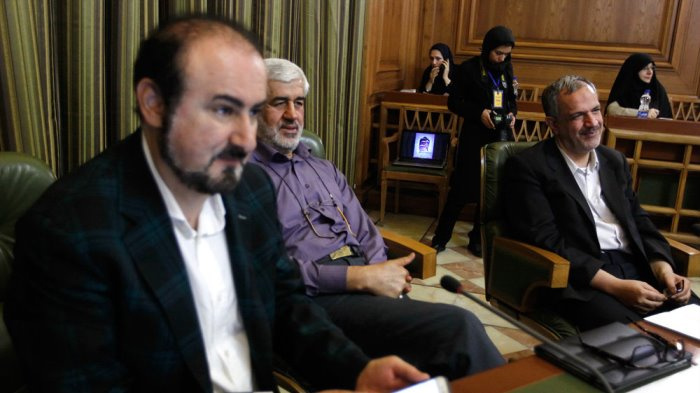Principlists Chasing Rainbow, Reformists Preparing for Local Elections

(From right: Ahmad Masjed-Jamei, Valiollah Shojapourian, and Abdol-Hossein Mokhtabad, Reformist members of Tehran City Council. Majid Asgaripour/Mehr)
Political muscle-flexing in the parliament still goes on.
After the Reformists’ sweeping victory in securing votes of confidence for President Rouhani's three candidates for Ministries of Education, Culture, and Sports last week, the camp made another major gain on Thursday, as members of its so-called Hope Caucus were elected to the Councils elections supervisory panel.
As Shargh daily notes, the recent election was particularly important for both sides. In 2013, the supervisory panels of the Principlist-dominated Majlis swept, by disqualification, many Reformist rivals aspiring to city council seats, especially in Tehran Tehran. Violations were reported and in some cases such as Karaj, litigations followed, even annulling the elections in some constituencies.
According to moderate Principlist website of Tabnak, lawmakers chose members of the supervisory panel in an open parliamentary session on Thursday. From among ten candidates proposed by the Principle 90 Committee of Majles, and the Councils and Majlis Interior Affairs Committee, the pro-reform Hope caucus managed to put all its three candidates into the five-man panel.
Their opposite number, i.e. the Principlists, had targeted all the chairs available with a list of five candidates. According to the constitution, the Councils and Majlis Interior Affairs Committee and the Principle 90 Committee have three and two chairs respectively, in the central board that oversees the nation-wide councils elections.
The recent reformists' gain has left their contestants in a state of shock. Some lawmakers believe it is time the Principlists came to terms with the new reality that Hope block has reached a majority in the parliament. Others argue that after almost six months from the opening of the tenth Majlis, the Hope bloc has established it integrity and is thus now able to influence the balance of power.
“The councils elections was of a particular significance for the Hope caucus and Reformists, so integrated planning was carried out in order to avoid what happened in 2013,” Tehran’s Reformist representative in Majlis, Mahmoud Sadeghi told Tabnak.
This means that prominent Reformist figures, disqualified in previous terms by either the Guardian Council or the parliament, could have an easier path to compete in the election.
The elected members will definitely make no decision but enforce the law, assures the spokesman of the Hope bloc. “If there were obstacles and people were being disqualified without legal evidence regardless of inquiries from legal authorities or based on personal preferences, in this term we will try to enforce the letter of the law,” Bahram Parsaei of Shiraz stated.
Previous showdowns over such supervisory panels seemed to have a volatile pattern: Principlists would win supervision on the state-run TV and radio and the Reformists came in charge of supervising the press. However, a trend is emerging in recent days, after all the three ministers that President Hassan Rouhani had proposed won the vote of confidence despite being accused of involvement in the ‘sedition’ (a term in official lingo referring to post-presidential election protests in 2009.)
Radical Principlists have already started to show early signs of comparing the tenth Majlis with the Reformist-dominated sixth, which they see as anti-revolutionary. Mashhad Friday Prayers Leader Ahmad Alamolhoda used the soapbox to lambast unnamed lawmakers as advocates of the US-backed 2009 sedition. Drawing on a quote from Prophet Mohammad (PBUH), Alamolhoda said the ground is paved for the infiltration of [a new] sedition in the parliament.
The City and Village Councils elections, otherwise known as local elections, is considered a preliminary platform for parliamentary and presidential races.
Last month, the leader of the parliament’s Reformist bloc Mohammad-Reza Aref said his camp was considering a strong participation in the elections and called on their rivals to do the same, for a more elated race.

